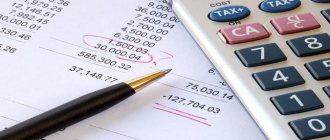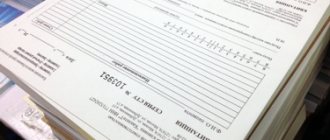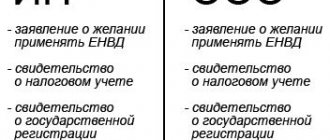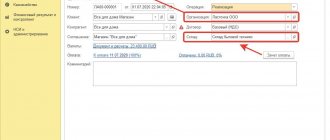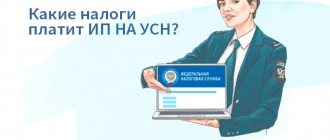The taxation system is usually called the total set of fees and taxes that are levied in the manner established by the relevant legislative and regulatory acts. In most cases, when registering with the tax authorities, you can choose a tax system based on the type of activity performed, the tax base and other factors. At the moment, the legislation of the Russian Federation establishes five different taxation systems:
- General (traditional) taxation system (selected automatically unless otherwise specified);
- Simplified taxation system (some payments are replaced by a single tax levy);
- Unified
USAT ) (for agricultural producers); - UTII - Unified tax on imputed tax (only for those who fall under this type of taxation);
- PSN – Patent taxation system (only for individual entrepreneurs with a certain type of activity).
Types of taxation in the Russian Federation
Tax legislation provides an opportunity for organizations and individual entrepreneurs to choose the types and procedure of taxation. From the moment of registration, all organizations and individual entrepreneurs apply a common taxation system. The taxpayer must notify the Federal Tax Service of his decision to apply other types of tax regimes.
Taxation systems in Russia: table 2020
| Types of tax systems | Abbreviation | Heads of the Tax Code of the Russian Federation | Who can apply | Reporting provided in connection with the application | ||
| Organizations | Individual entrepreneurs | Name | Periodicity | |||
| Conventional system | OSN | 21, 23, 25, 30 | V | V | VAT declaration | Quarterly |
| Income tax return | ||||||
| Declaration and quarterly calculations for property tax | ||||||
| Financial statements | Annually | |||||
| Information on the average number of employees | ||||||
| Simplified system | simplified tax system | 26.2 | V | V | Declaration according to the simplified tax system | Annually |
| Financial statements | ||||||
| Information on the average number of employees | ||||||
| A single tax on imputed income | UTII | 26.3 | V | V | Declaration on UTII | Quarterly |
| Unified agricultural tax | Unified agricultural tax | 26.1 | V | V | Declaration on UTII | Annually |
| Patent system | PSN | 26.5 | — | V | — | |
Next, we will try to indicate in more detail the tax regimes in force in the Russian Federation and describe the limitations of the forms of taxation in Russia.
Types of systems
Let's start with a short list. It will help you understand from which you can generally choose the type of transfer of part of the profit for doing business.
Currently in Russia there are the following types of taxation:
- OSNO;
- USN (simplified);
- UTII (imputation);
- Unified Agricultural Sciences;
- PSN.
Unified agricultural tax is almost never used in practice. Therefore, you should not focus much attention on it. Let's look at other types of taxation and their characteristics. It is not difficult to understand all this.
OSN: what types of taxation exist
As mentioned above, OCH is applied by default. To apply it, there is no need to notify the Federal Tax Service. Notification will only be required if the company previously applied the special regime and then decided to return to the normal system.
The following types of taxes are paid on OSN:
- Organizations - VAT, income tax, property tax;
- Individual entrepreneur - VAT, personal income tax.
Also, such taxpayers pay all other taxes for which they have obligations under the law.
OSNO and business
The most common scenario is the use of a common taxation system. It is selected by LLC or Individual Entrepreneur by default. The arrangement is not always profitable, especially at the very beginning of a business.
It involves serious paperwork and very large taxes. Therefore, many entrepreneurs often refuse OSNO. For some, this option is suitable.
To briefly describe the tax payment system, in this case you will have to transfer funds for the organization’s property and income. VAT also applies. It is this component that allows you to choose or refuse OSNO.
simplified tax system
The transition to a simplified system eliminates the need for organizations to pay VAT, income and property taxes, and individual entrepreneurs - VAT and personal income tax. You can switch to the simplified tax system on a voluntary basis either from the start of business or from the beginning of a new calendar year. To do this, you must submit a notification to the Federal Tax Service and also meet certain criteria:
- annual income does not exceed 150 million rubles;
- average number of employees - no more than 100 people;
- residual value of fixed assets - no more than 150 million;
- the share of other organizations in the authorized capital is a maximum of 25%;
- the organization has no branches or representative offices.
What types of taxation systems there are on the simplified tax system are indicated in Article 346.14 of the Tax Code of the Russian Federation. The payer has the right to choose the object of taxation on which the rate will depend:
- “Income” - rate 6%;
- “Income minus expenses” - the rate is 15%.
Is it possible to combine tax regimes?
Entrepreneurs and organizations can combine two or three tax regimes. The main requirement of the tax code is that an individual entrepreneur or LLC must comply with the requirements of the selected systems.
The table below shows allowed and prohibited links:
| Option | Allowed |
| OSNO + simplified tax system | No |
| OSNO + ESKHN | No |
| OSNO + UTII + PSN | Yes |
| USN + UTII | Yes |
| USN + Unified Agricultural Tax | No |
| USN + PSN | Yes |
| UTII + Unified Agricultural Tax | Yes |
| UTII + PSN | Yes |
| Unified agricultural tax + PSN | Yes |
| STS + UTII + PSN | Yes |
Important! The options presented in the table with the patent tax system (PTS) are relevant only for individual entrepreneurs. Legal entities (LLC) are prohibited from using a patent.
Tax regimes are combined to reduce the tax burden. Let's look at a specific example of how this works.
Individual entrepreneur Dmitry Nikolaevich Cherednichenko organized a car service in Chelyabinsk. To provide passenger car repair services, he chose the simplified taxation system “Income minus expenses” (15%). On the basis of a car service center, he opened a small store (32 square meters) of auto parts for cars.
Planned profit (difference between income and expenses):
- car repairs - 900,000 rubles;
- sale of spare parts - 570,000 rubles.
For the main area of activity Cherednichenko D.N. at the end of the year he must pay 135 thousand rubles, and for additional - 85,500. To reduce the tax burden, the entrepreneur decided to buy a patent for the sale of auto parts.
The Federal Tax Service calculated the cost of the patent - 27,456 rubles. The application of PSN to the sale of auto parts will allow Cherednichenko to save 58,044 rubles on taxes annually.
Combination is rational in cases where it is possible to reduce contributions to the budget. Moreover, the savings should compensate for the time and labor costs of changing the regime and preparing additional reporting.
Experienced entrepreneurs at the planning stage of a new business take into account the difference in tax rates in different regions. For example, there are often situations where in region “A” a patent costs 25,000 rubles, and in neighboring region “B” for the same activity it costs 45,000. In such cases, people think about organizing a new business in a region with a lower tax burden.
UTII
The use of UTII is possible only for certain types of activities. Their complete list is given in paragraph 2 of Art. 346.26 Tax Code of the Russian Federation. The decision to introduce UTII is made by local authorities. Therefore, in some regions this special regime does not apply (for example, in Moscow).
UTII, like the simplified tax, replaces the payment of VAT, income and property taxes, as well as personal income tax (for entrepreneurs). In addition to the type of activity, there are also other restrictions for the use of the special regime:
- the share of other organizations in the authorized capital is a maximum of 25%;
- average number of employees - no more than 100 people.
The amount of payment to be transferred to the budget does not depend on the actual income of the payer. It is calculated based on imputed income at a rate of 15%. Local authorities may set a different rate depending on the category of taxpayer or type of activity in the range from 7.5 to 15%.
Imputed income is determined based on the basic profitability for the type of activity and the physical indicator characterizing the activity (Article 346.29 of the Tax Code of the Russian Federation).
What is considered a tax?
Next, we will analyze the control function of tax authorities and taxes.
First, let's look at the characteristics of the term. A tax is an individual, gratuitous, mandatory payment levied forcibly by special government bodies from individuals and various organizations. The purpose of such a collection is to ensure the financial activities of both the state in general and its municipalities.
At the same time, taxes are distinguished from all kinds of fees and duties, the collection of which is not free of charge, but is a condition for the payers to perform certain actions, provide them with government services, prepare any documentation, etc.
The collection of taxes in the Russian Federation is regulated by the Tax Code. All of them are divided into federal, local and regional. The list of specific taxes in each group is approved by the Tax Code.
The totality of all established taxes, forms, methods, principles of their collection, establishment, abolition, control and change is the tax system of the state.
It is important to highlight such tax elements as:
- Taxpayers.
- The tax base.
- Objects of taxation.
- Tax benefits.
- Units of taxation.
- Orders of calculation.
- Tax rates.
- Sources of tax.
- Tax periods.
- Payment procedures.
- Tax salaries.
- Tax payment deadlines.
These contributions to the state treasury are a very common category. Therefore, several classifications have been introduced regarding taxes:
- Direct and indirect.
- Accord and income.
- Regressive, progressive and proportional.
PSN
This type of special taxation can only be applied by individual entrepreneurs. To use it, you must purchase a patent for the relevant type of activity. PSN can be combined with any other taxation system. Purchasing a patent replaces the need to pay VAT and personal income tax.
The cost of a patent will be calculated by the Federal Tax Service upon its issuance. But you can first make a calculation on the official service of the Federal Tax Service.
There are restrictions on the use of PSN:
- number of employees - no more than 15 people;
- annual income from activities on PSN - no more than 60 million rubles.
Disadvantages of Patents
Now let's look at the disadvantages of this option. As already mentioned, PSN is available only to entrepreneurs. LLCs will not be able to work with her under any circumstances.
At the moment, the patent system has the following weaknesses:
- can be used for some types of activities;
- not always profitable;
- the company should not have more than 15 employees;
- it is impossible to reduce taxes on mandatory contributions to the Pension Fund;
- annual profit cannot exceed more than 60,000,000 rubles;
- The cost of a patent is different in all regions of the Russian Federation.
Nevertheless, this arrangement seems very attractive to some. In order to decide on the choice of tax payment system, you need to evaluate all the pros and cons of each proposal. This is the only way a person will make the right decision.
Unified agricultural tax
Unified agricultural tax is a specially developed special regime for agricultural enterprises. Thus, the main limitation for its application is agricultural production. The tax rate is set at 6% of the amount of income reduced by the amount of expenses.
Since 01/01/2019, constituent entities of the Russian Federation have been granted the right to establish a differentiated unified agricultural tax rate in the range from 0 to 6%, depending on the type of product produced, location of activity, income level or headcount.
History of origin
Even in the past millennia, people accepted the need to pay part of their income to replenish the treasury. Every resident of the state must understand why taxes are needed, and is obliged to periodically give a small amount for the development of education, medicine, and the maintenance of the army. Society cannot function normally without a certain cash flow.
The useful function of taxes is obvious, although not very pleasant for some individuals. Previously, due to taxes, the crazy ideas of rulers to take over the world were realized. But there have also been positive states in history, in which medical and philosophical organizations were built, care was taken for the poor, and orphanages were built for orphans.
For the functioning of all state institutions, a continuous flow of funds is required. Moreover, the more socially significant the policy is carried out, the higher the percentage of payments to the treasury becomes. Why are taxes needed if the authorities can print the required amount of money themselves? The answer to this question may be an analogy of comparison with the internal separate structure of society. Let's take the housing and communal services sector.
Insurance premiums
In addition to these payments, any organizations and individual entrepreneurs pay insurance premiums from payments to employees. The normal premium rate is:
- 22% - for pension insurance;
- 2.9% - for social insurance;
- 5.1% - for health insurance.
Some categories of policyholders in special regimes have the right to apply a reduced rate of insurance premiums. It is set at 20% for pension insurance. Contributions to compulsory medical insurance and social security fund are not paid at all. The following are eligible for a reduced rate:
- organizations and individual entrepreneurs on the simplified tax system with the main activities listed in paragraphs. 5 p. 1 art. 427 Tax Code of the Russian Federation;
- Individual entrepreneurs on UTII with a license for pharmaceutical activities;
- IP on PSN
Individual entrepreneurs also, regardless of the system used, transfer insurance premiums for themselves:
- fixed payment (regardless of income received): set annually. In 2021 it is equal to 36,238 rubles;
- additional contribution to the Pension Fund in the amount of 1% on the amount of excess income of 300,000 rubles. in a year.
Pros of a patent
Types of taxation for LLCs do not provide for PSN. But entrepreneurs may face this situation.
Patents are convenient. But why? It is customary to highlight the following positive aspects of the regime:
- there is no dependence of the tax amount on real profit;
- minimal paperwork;
- there is no need to use cash registers;
- you can buy a patent for a period of 1 to 12 months;
- taxes are paid either before the expiration of the patent (if it was purchased for a period of up to six months), or 33% of the amount is transferred no more than 90 days after acquisition, and the balance - until the end of the validity of the individual entrepreneur's PSN;
- It is allowed to register several patents at once.
Accordingly, today many entrepreneurs pay attention to PSN. In particular, if this regime is applicable to a particular type of activity.
Why do the State need taxes?
The deduction of various taxes to the state is necessary to finance the healthcare system, culture, education, defense, social support, and the maintenance of various administrative apparatuses. To create effective government institutions, a constant flow of funds is necessary.
Due to tax revenues, the population of Russia receives free medical care, repaired roads, schools, kindergartens, social institutions are also built, for example, orphanages, the state pays unemployment benefits, targeted assistance, finances programs for young families to purchase housing, maternity capital, etc. .d. By systematically paying taxes, the population acts as co-investors in their comfortable life.
